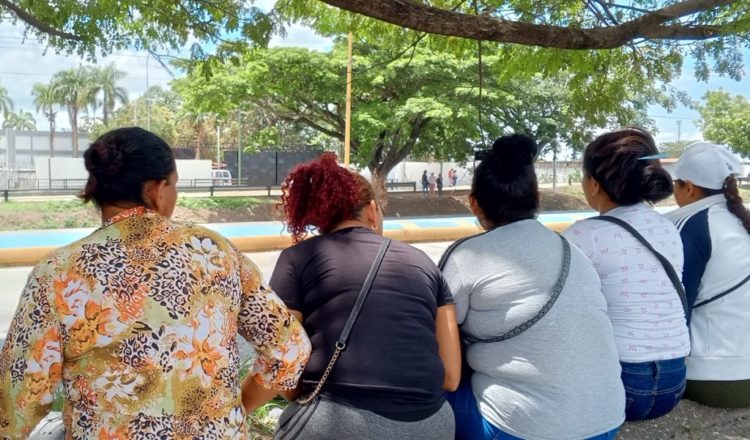Relatives of prisoners in Tocuyito still have no information

Mrs. Teresa* spends all day sitting in front of the Tocuyito prison. She hopes that at some point they will give her information about her husband, a 61-year-old man, arrested after the presidential elections in July. He was arrested in Boconó, Trujillo state, and taken to Carabobo.
On August 25, Teresa received a call that brightened her day, as she heard her husband’s voice, but the news was not good: “I’m in the Carabobo judicial detention center, in Tocuyito,” José* told her. He was sent more than 400 kilometers away from his town.
Without hesitation, the woman packed a suitcase and headed for Valencia, where she settled. She had to rent a room near the prison. She will not leave until her husband is released, she says.
She tells the story: It was August 2, in Boconó. There was a wake at the Pérez* house. José’s mother had passed away. In the living room they were praying the rosary, while José was preparing lunch. Suddenly, about 80 hooded and armed men were in the courtyard of the house.
-At your service, José said through the window to an official.
They asked for his ID and They ordered him to accompany them.
-How are they going to take him? We are going to bury his mother, Teresa told the soldiers.
-Shut up, ma’am, or we’ll take you too, the uniformed man threatened.
The procedure was carried out by the National Guard, but later passed into the hands of the Bolivarian National Police. José’s crime was to become involved in politics in Boconóbut the police report says resistance to authority and the arrest warrant says different crimes: incitement to hatred and terrorism. He was not entitled to a private lawyer.
A young man, also from Trujillo state, is deprived of his liberty for writing a message on his WhatsApp status against the Government. He was a school worker and was allegedly singled out by the school’s director. He was the target of the “tun tun operation.”
Prisoners from the south of the country in the Tocuyito prison
Several women outside the prison are now a family. Many have something in common: their children or nephews were transferred from the south of the country to Carabobo.
They left Bolívar state in the early hours of August 30, just before the national blackout. Many of them went to Caracas, hitchhiking, and then to Valencia, to try to be close to their detained relatives. But more than a week has passed and they have not heard from them, and they are not even allowed to bring food or clothing.
Around 4:00 p.m. they start to signal each other with shirts or hands. They know more or less which side of the jail their people are on because they use a kind of sign code, which they also used when they were in Puerto Ordaz.
On Monday morning, some of the women made a banner with a happy birthday message, in an attempt to send congratulations to one of the young men deprived of their liberty.
Arrested by groups
There is one group that agrees on one thing: they were detained between July 29 and 30 by alleged armed and hooded groups and handed over to the Bolivarian National Police. Many of them were even far from where the post-election protests were taking place.
Seven others, some seven men, were arrested in their homes. They work at the El Callao City Hall. Their relatives say they do not know why the DGCIM arrested them.
There are those who do not even have confirmation that their relatives have been transferred from other states to the Tocuyito prison. They cannot go to the facility to ask. They know nothing. Some are afraid to speak. Others do not care about exposing themselves to the press.
Some of the prisoners have complex health conditions. In fact, the only thing they have been able to get are medicines.
Outside, they just want to see their relatives, to be allowed visits or, at least, to have information about them.
*Fictitious name to protect the true identity of those involved.
Independent journalism needs the support of its readers to continue and ensure that uncomfortable news that they don’t want you to read remains within your reach. Today, with your support, we will continue working hard for censorship-free journalism!
